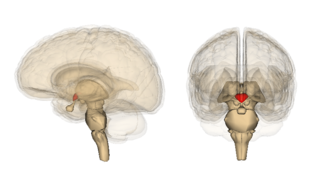TDP or tdp may refer to:
TDP or tdp may refer to:

Thiamine, also known as thiamin and vitamin B1, is a vitamin, an essential micronutrient for humans and animals. It is found in food and commercially synthesized to be a dietary supplement or medication. Phosphorylated forms of thiamine are required for some metabolic reactions, including the breakdown of glucose and amino acids.
UDP may refer to:
Adp or ADP may refer to:

In chemistry, pyrophosphates are phosphorus oxyanions that contain two phosphorus atoms in a P−O−P linkage. A number of pyrophosphate salts exist, such as disodium pyrophosphate and tetrasodium pyrophosphate, among others. Often pyrophosphates are called diphosphates. The parent pyrophosphates are derived from partial or complete neutralization of pyrophosphoric acid. The pyrophosphate bond is also sometimes referred to as a phosphoanhydride bond, a naming convention which emphasizes the loss of water that occurs when two phosphates form a new P−O−P bond, and which mirrors the nomenclature for anhydrides of carboxylic acids. Pyrophosphates are found in ATP and other nucleotide triphosphates, which are important in biochemistry. The term pyrophosphate is also the name of esters formed by the condensation of a phosphorylated biological compound with inorganic phosphate, as for dimethylallyl pyrophosphate. This bond is also referred to as a high-energy phosphate bond.

Processor power dissipation or processing unit power dissipation is the process in which computer processors consume electrical energy, and dissipate this energy in the form of heat due to the resistance in the electronic circuits.
CDP may refer to:
DPT may refer to:

The Democratic Party of Turkmenistan is a political party in Turkmenistan founded in 1991. It has been the ruling party of the country since its foundation.

The Telugu Desam Party is an Indian regional political party with influence in the states of Andhra Pradesh and Telangana. It was founded by Telugu movie star N. T. Rama Rao (NTR) on 29 March 1982 and has focused on supporting Telugu people. The party has won a five-time majority in the Andhra Pradesh Legislative Assembly and has emerged as the most successful political outfit in the state's history. It is currently the ruling party in the Andhra Pradesh Legislative Assembly.

Wernicke encephalopathy (WE), also Wernicke's encephalopathy, or wet brain is the presence of neurological symptoms caused by biochemical lesions of the central nervous system after exhaustion of B-vitamin reserves, in particular thiamine (vitamin B1). The condition is part of a larger group of thiamine deficiency disorders that includes beriberi, in all its forms, and alcoholic Korsakoff syndrome. When it occurs simultaneously with alcoholic Korsakoff syndrome it is known as Wernicke–Korsakoff syndrome.

Thiamine pyrophosphate (TPP or ThPP), or thiamine diphosphate (ThDP), or cocarboxylase is a thiamine (vitamin B1) derivative which is produced by the enzyme thiamine diphosphokinase. Thiamine pyrophosphate is a cofactor that is present in all living systems, in which it catalyzes several biochemical reactions.

The thermal design power (TDP), sometimes called thermal design point, is the maximum amount of heat generated by a computer chip or component that the cooling system in a computer is designed to dissipate under any workload.
TPP may refer to:

Turkmenistan elects on national level a head of state — the president — and a legislature. The elections in Turkmenistan since its split from the Soviet Union have been widely criticized for being neither free nor fair and attempting to give an appearance of legitimacy to what is in reality a dictatorship. The parties of Turkmenistan are the Democratic Party of Turkmenistan, the Agrarian Party of Turkmenistan, and the Party of Industrialists and Entrepreneurs. The president has a seven-year term, while the legislature has a five-year term.

Transketolase is an enzyme that, in humans, is encoded by the TKT gene. It participates in both the pentose phosphate pathway in all organisms and the Calvin cycle of photosynthesis. Transketolase catalyzes two important reactions, which operate in opposite directions in these two pathways. In the first reaction of the non-oxidative pentose phosphate pathway, the cofactor thiamine diphosphate accepts a 2-carbon fragment from a 5-carbon ketose (D-xylulose-5-P), then transfers this fragment to a 5-carbon aldose (D-ribose-5-P) to form a 7-carbon ketose (sedoheptulose-7-P). The abstraction of two carbons from D-xylulose-5-P yields the 3-carbon aldose glyceraldehyde-3-P. In the Calvin cycle, transketolase catalyzes the reverse reaction, the conversion of sedoheptulose-7-P and glyceraldehyde-3-P to pentoses, the aldose D-ribose-5-P and the ketose D-xylulose-5-P.
PDP may refer to:

Benfotiamine is a synthetic, fat-soluble, S-acyl derivative of thiamine that is approved in some countries as a medication or dietary supplement to treat diabetic sensorimotor polyneuropathy. Benfotiamine was developed in late 1950s in Japan.
A bloc party, sometimes called a satellite party, is a political party that is a constituent member of an electoral bloc. However, the term also has a more specific meaning, referring to non-ruling but legal political parties in a one-party state (most notably communist states as auxiliary parties and members of a ruling coalition, differing such governments from pure one-party states such as Nazi Germany and the Soviet Union, although such minor parties rarely if ever constitute opposition parties or alternative sources of power. Other authoritarian regimes may also have multiple political parties which are nominally independent in order to give the appearance of political pluralism, but support or act in de facto cooperation with the government or ruling party.

Ivy Bridge is the codename for Intel's 22 nm microarchitecture used in the third generation of the Intel Core processors. Ivy Bridge is a die shrink to 22 nm process based on FinFET ("3D") Tri-Gate transistors, from the former generation's 32 nm Sandy Bridge microarchitecture—also known as tick–tock model. The name is also applied more broadly to the Xeon and Core i7 Extreme Ivy Bridge-E series of processors released in 2013.
A biphosphate is any of the following :